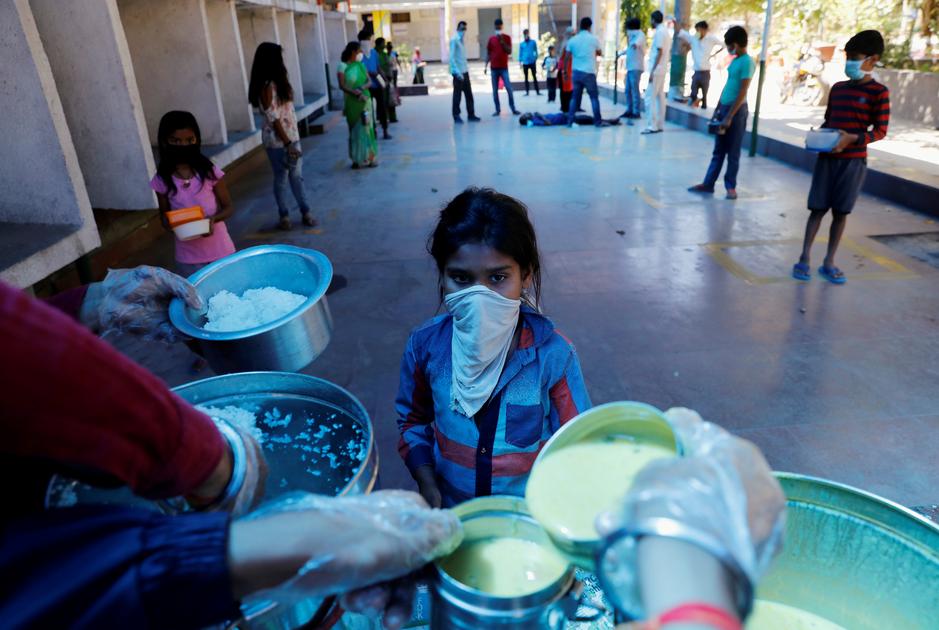Want To Stop Another Pandemic? Consider A Flexitarian Diet
Jul 12, 2022 | Pratirodh Bureau
FILE PHOTO: A child waits to receive food in Ghaziabad, on the outskirts of New Delhi
Stemming global warming and species extinction requires a rethink of the global food system. The risk of pandemics could be the trigger for change.
Asking everyone to become vegan is neither realistic nor even desirable. But livestock production has the highest environmental footprint of all foods. If the global human population continues to grow and adopt livestock-based diets, we are unlikely to slow global warming or stem the alarming rate of species extinction.
Flexitarian diets could feed the growing world population with less greenhouse gas emissions. Another potential benefit is reduced risk of disease outbreaks and pandemics.
Flexitarians consume large amounts of plant-based foods (including vegetable proteins like pulses, nuts and seeds), modest amounts of fish, poultry, eggs, and dairy, and small quantities of red and processed meat.
If more of us were flexitarian there would be a reduction in livestock production and a stemming of the unprecedented expansion of farmland into tropical wildlands. This could reduce contact between wild animals, livestock and people and the likelihood of pathogens jumping from one to the other.
Habitat destruction negatively impacts large wild animals in particular, while ‘generalist’ species of rodents, bats, birds, and primates that are better adapted to human-modified landscapes remain or increase. Some of these species are known ‘reservoirs’ for infectious diseases of livestock and humans. Intensive livestock farms further increase the likelihood that domesticated animals become intermediate hosts for wildlife-borne diseases, often amplifying the risk of their transmission to humans.
A flexitarian dietary shift would have other public health benefits too, such as reducing obesity, diabetes, heart diseases and colorectal cancer.
Diets low in livestock source foods are central to creating a sustainable global food system – particularly if partnered with shifts to environmentally friendly and organic farming, and cutbacks in food losses and wastage. Research suggests greater investment in crop varieties, cattle breeds and management practices better suited to low-input organic farming could significantly increase productivity.
There are many measures available to governments and businesses to promote healthier and more sustainable levels of consumption of meat and dairy, such as through education in schools, training of physicians and pediatricians, eco-labels on food packaging, taxation of meat and dairy consumption, food procurement for workplaces, schools and hospitals, and a statutory duty for retail and hospitality sectors.
These measures should target excessive consumption in wealthier economies and the expanding metropoles of developing economies. In poorer rural areas of developing countries, home gardening as well as smallholder livestock development programmes can help decrease malnutrition, with more limited environmental impacts. Populations inhabiting lands that are inhospitable for crop cultivation – such as hunter-gatherer and pastoralist communities – would instead continue to rely conspicuously on animals for nutrition. Yet, the low environmental impacts of their subsistence way of living are not comparable to those of dense and better-off urban populations.
Governments tend to dodge such interventions for fear of public backlash. And yet there is public expectation of government leadership in tackling such a complex challenge.
The harvest and trade of tons of wild meat from tropical forests to meet increasing demand from nearby cities is not helping, as it constitutes another potential path of emergence of infectious disease.
In the absence of effective state law enforcement and sustained campaigns to reduce urban demand, bans do not work. Consumers’ strong preferences for wild meat mean they may continue to purchase it despite price increases induced by a ban, giving rise to black markets. In the case of ‘luxury meat’, increased price and rarity may even drive-up demand.
Outright bans can have other undesired effects. While in most cities and towns legumes, fish and livestock source proteins are easily available at affordable prices, there are indigenous and rural communities who rely on hunted meat for a vital part of their nutrition and income. Their rights to sustainably provision themselves within their territories should be safeguarded.
Bans also shift wild meat trade to illegal, unregulated channels where less attention is usually paid to biosecurity measures necessary to prevent contagion from wildlife-borne diseases.
Containing tropical wild meat hunting and trade by curbing demand in urban areas and extractive outposts should therefore be implemented while promoting access rights and biosecurity measures among communities in remote subsistence areas.
Interventions in rural communities should provide wild meat hunters, traders, and butchers with training in inexpensive biosecurity measures they can easily adopt to avoid infection from contact with wild animals. These include wearing protective clothing when handling wild animals, wrapping carcasses to prevent blood from contacting cuts in people’s skin, and cooking wild meat thoroughly before eating. Biosecurity measures should also be extended to livestock and wildlife farms, abattoirs, food markets and restaurants.
Other physical distancing measures should also be practiced at farms and markets, such as fencing and reducing livestock densities to minimise contact with wild herbivores, planting fruit trees visited by bats at a distance from livestock sites, and limiting the number of animals on sale in live animal markets.
The incidence of infectious diseases originating in wild animals is high and may be increasing. This may be yet another sign of how our degradation of ecosystems is undermining the capacity of our planet to sustain human health and well-being.
Dietary shifts away from livestock source foods and reductions in tropical urban wild meat demand are crucial to simultaneously protect the environment, safeguard poorer communities, and reduce the risk of further disease outbreaks and pandemics.
(Originally published under Creative Commons by 360info™)
